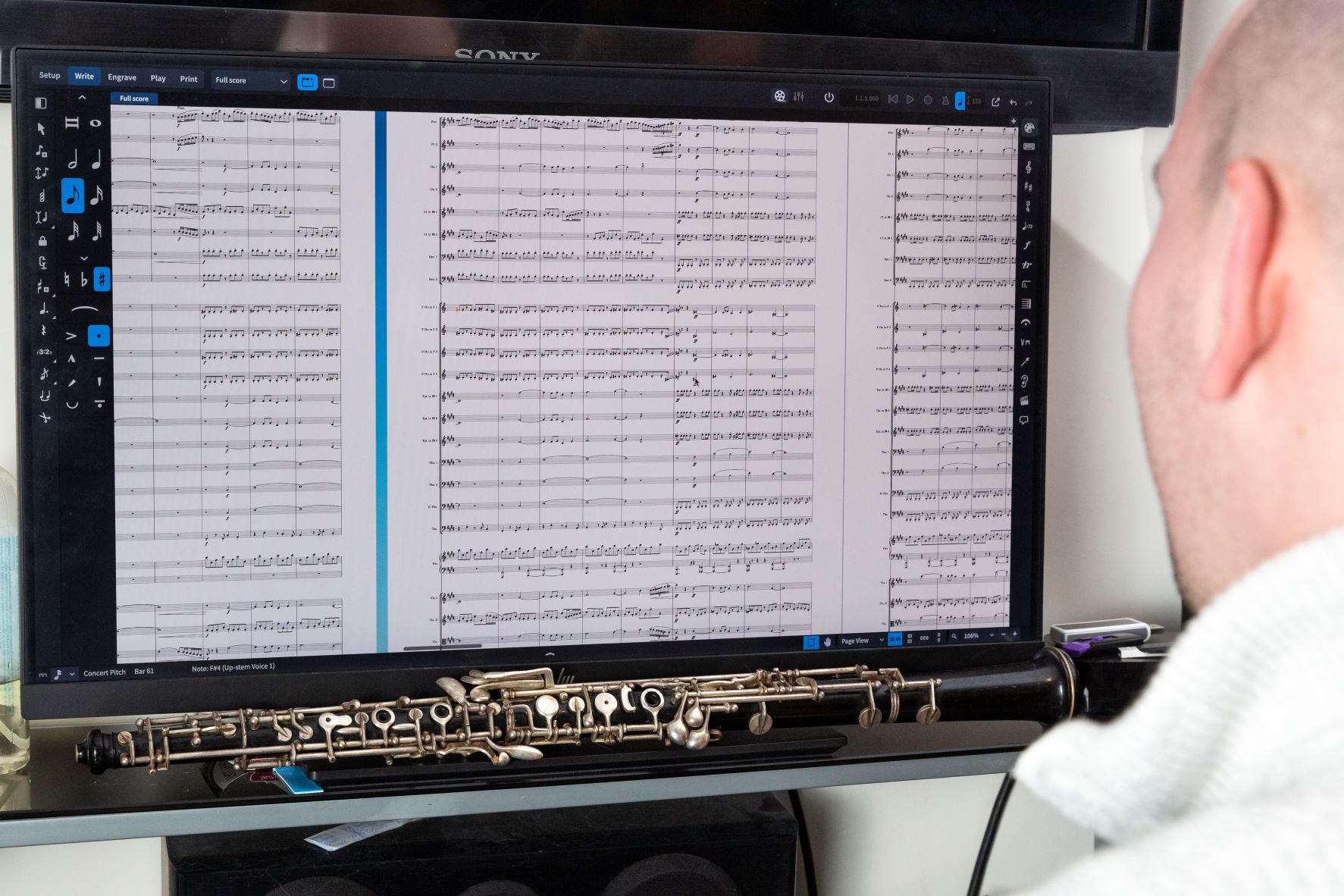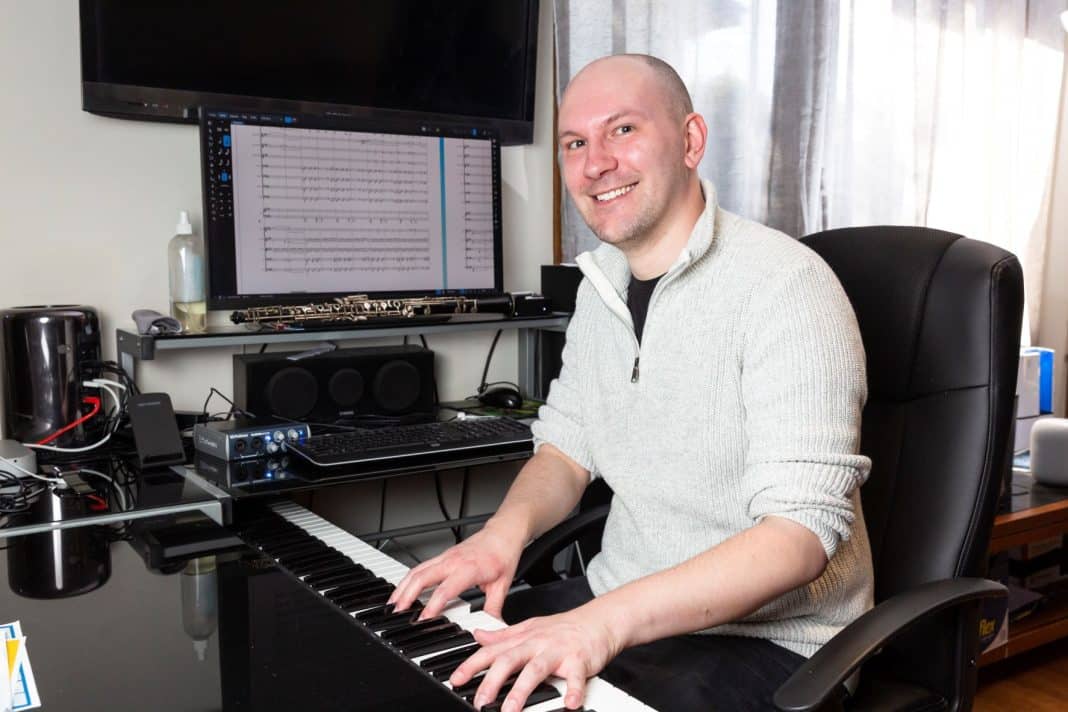Canberra-based composer Matthew J Webster has struggled with mental health most of his life, spending time in and out of hospital throughout his adult life before a controversial therapy helped him get a better hold of his illness.
Now at 30, Webster is making an album about his struggles in the hope of helping others who may be experiencing something similar. Half of the profits will be put straight back into mental health charities.
Webster discovered his love for composing when he went to see a film with a friend. He laughs as he says it’s the silliest story ever to discover a love for orchestral composing while watching the Da Vinci Code, walking out and wanting to write music for film.
“The music is really good, and I stand by that. I don’t think I really watched the film at all; I was just sitting there listening to the music the whole time,” he smiled.
He wasted no time in downloading free composing software and began creating music.
The album Webster is working on was originally released as an album played by computer instruments when he was paid to compose for theatre programs before launching his own work. Although self-taught, Webster has some incredible accomplishments under his belt. Just a year after seeing the Da Vinci Code, he won an international under 18s award for composing. He has received more local awards and travelled around the country and internationally, even taking a trip to Monaco for a performance.
“I think if younger me saw me today he’d be like ‘damn, he’s actually doing what he wanted’. It’s hard to see that sometimes.”
Webster started posting videos to Tik Tok and has gained a following of over 34,000, some of whom often message him to say how the album has helped them get out of bed or given them a reason to keep going.
Fifty per cent of any profits made will go directly into mental health organisations around the ACT. First on the list will probably be the Acacia ward at Calvary Hospital; having spent time there, Webster knows there are thing patients need that the ward can’t afford.
I just want to make a difference the only way I know how which is music.
Another charity he wants to support is Lifeline Canberra to help people in crisis get the help they need, having experienced how difficult it can be to get help when you feel like you need it most. Webster says even when you try to avoid going back to hospital because business stops, bills still need to be paid, people can still slip back to that place, and it’s important to support charities that try to prevent that.
Music has been an important part of his life for as long as he can remember, unable to recall a time when he wasn’t playing the piano. His sisters were given lessons, but he taught himself, sitting at the piano improvising with different sounds to find something that sounded nice, a form of composition.
Not only is music his passion, but it is also a form of therapy for Webster who was diagnosed with bipolar disorder when he was 18. However, his mental health issues started when he was much younger. He had to leave Year 7 when the depression he had been diagnosed with worsened; he also dropped out of Year 9 completely and did not successfully complete Years 10-12 even though he attempted all of them.
Webster says he wasn’t diagnosed with bipolar sooner as it normally takes longer for the mania side of the disorder to come in to play because the brain is still developing. Until the mania presents, people will be viewed as having bad depression.
He says it is important to note that the disorder presents itself differently for each case; some people may have hypersexual tendencies, gambling, drug, or alcohol dependencies, while others could be prone to angry outbursts.
When talking about how the disorder affects him, Webster explained the lows are the worst depression one could image with intense suicidal thoughts, paranoia, and delusional thinking. He recalls self-harming a lot during his teenage and young adult years but is thankful to not have fallen back into that place.
The manic highs make him feel elevated constantly with a massive sense of self and thinking nothing could hurt you. During one of his manic highs, Webster recalls running up a $20,000 debt in just one shopping incident at a major home entertainment retailer.
“When I get manic, I’m like I am the next Mozart, which is really embarrassing because you try and talk to your psychologist about that and they’re like ‘are you actually good at music?’”

Webster first started seeing psychologists in Year 7 after his diagnosis of depression; over the next few years he also started taking antidepressants. Things came to a head when he was about 20 and attempted suicide while his parents were out of town; a friend found him and took him to hospital. Over the next several years he would be back multiple times a year. Webster said that due to the mental health sector being underfunded, he wasn’t receiving the care he needed. Each time they would send him back out without a plan for long term support and the cycle would repeat.
In 2019, exhausted and not wanting to be unwell his whole life, the depression Webster suffers is medication-resistant which led him to try an alternative in Electroconvulsive therapy (ECT). The therapy is used to treat certain psychiatric conditions by passing small electric currents through the brain to alter its chemistry and relieve symptoms. However, many medical practitioners are hesitant to perform the procedure, especially on younger patients.
“I went into an appointment with a community psychiatrist and I was like ‘either you give it to me or I’m going to walk out. I have a plan, I know exactly what I’m going to do, this is final’.”
After being given the all clear from three psychiatrists, he was able to receive nine courses of the treatment in a two-month period. He came out of the treatment feeling ‘normal’ for what he said was the first time in his whole life, something which lasted for about 18 months. He has since received another two courses of the treatment and is pushing to receive maintenance ECT.
“It’s helpful in a way to think of it like my brain’s wiring doesn’t quite work, and then if we reset the brain through ECT, I’m better for a while.”
Part of the hesitancy surrounding the procedure is the fact that it can cause memory loss. Webster laughed as he talked about messages he had sent his mother asking why he was in hospital following the treatment. However, he was afraid that the therapy would affect his ability to play and write music.
I was worried that I would forget how to play the piano because you don’t know what memories you’re going to lose.
Thankfully, Webster has retained his memory of music; in fact, he said when he came out of hospital he was playing better than ever as he was no longer anxious all the time or bogged down by depression.
It was after the first ECT course that Webster decided to pursue music fulltime, seeking something that would provide enough money to live while not sending him back to the hospital every few months. He teaches piano and singing to both children and adults and is currently fully booked out. All his clients have been supportive when he has ended up back in hospital, some even offering to come and feed his cats for him.
When not teaching, Webster is busy working on his orchestral album, This Too Shall Pass, which he is crowdfunding with a goal of $20,000 to help with the cost of hiring the Budapest Scoring Orchestra to record the tracks. Composing the album following his first round of ECT, he says it is like a film score, with each piece describing a different period throughout the process.
“It starts basically at the beginning of a downfall, entering that depression and then kind of going through and receiving it (ECT), feeling the first hope of it coming back, and then crashing; then by the end of it you are better,” he said.
Having an online presence means that there will be some hate comments, Webster has found ways of dealing with these by learning to be liberal with the block button and has recently started putting together a touch box. He is saving positive comments, reviews from his shows, messages from people telling him how much his music has helped, to be printed and placed in a box so that he can physically hold something positive when the negative comments lead to negative thoughts.
“I have a real physical thing that I can touch and hold that shows I have achieved stuff and I’m worth something.”
Webster is focusing on small and achievable goals, like getting the album made. He also has some overseas prospects in the works through his Tik Tok connections, including scoring an indie film from the United Stated and writing the music for a TV pilot in the United Kingdom.
“There’s a lot of support there but I don’t want to overreach with my dreams because that would just end badly. With mental health stuff, if something falls apart it would just lead to a spiral.”
We have been informed Webster’s fundraiser reached it’s $20,000 goal, with work to go ahead on the album.
You can find Webster on social media and streaming platforms under Matthew J Wester.
Get local, national and world news, plus sport, entertainment, lifestyle, competitions and more delivered straight to your inbox with the Canberra Daily Daily Newsletter. Sign up here.



